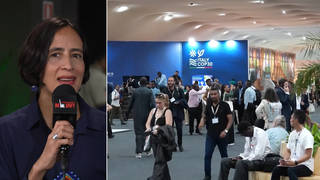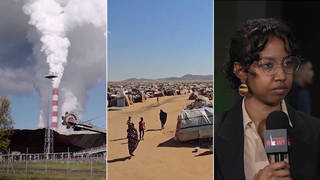
A group of Wall Street bankers and insurance companies, threw a brunch party for the Senate Banking Committee and the House Financial Services Committee at an upscale restaurant in Central Park. Among the many political guests was former Texas Senator Phil Gramm, who has been one of the biggest congressional advocates for the financial services industry. [includes rush transcript]
- Report from Pratap Cahtterjee of CorpWatch.
Transcript
AMY GOODMAN: As we turn now from the protests to the corporate parties that have also been going on throughout the week. The Financial Services Roundtable, a group of Wall Street bankers and insurance companies, threw a brunch party for the Senate Banking Committee and the House Financial Services Committee at the upscale Tavern On the Green Restaurant in Central Park. Among the many political guests, former Texas Senator Phil Gramm who’s been one of the biggest congressional advocates for the financial services industry.
JUAN GONZALEZ: Yes, in 1999 Gramm introduced a bill that removed the separation of banking, brokerage, and insurance operations for Wall Street firms, a separation that had been there since the Great Depression. This resulted in the kind of conflicts of interest that cleared the way for firms to taut worthless stock to win investment banking fees. Gramm’s wife, Wendy Lee, was a member of Enron’s Board of Directors.
AMY GOODMAN: We go now to Pratap Chatterjee’s report.
PRATAP CHATTERJEE: A number of staffers from offices from around the country to meet and greet politicians over breakfast at the Tavern On the Green to talk about issues of mutual interest. We spoke with Kim from the company’s Washington, DC office.
KIM: We’re going to be honoring three New York members of Congress that are on the financial services industry that have been supportive of issues that help investors and so we’re going to honor what they’ve done for the industry and for investors.
PRATAP CHATTERJEE: Do you work for Charles Schwab also?
KIM: Yes, I do.
PRATAP CHATTERJEE: Okay. So could you maybe describe the issues they’ve worked on and how they’ve supported the industry?
KIM: Sure. They’ve worked on issues such as, you know, giving people more access to the capital markets, decreasing taxes, helping people to be able to invest more in individual retirement accounts, reforming the mutual fund industry, those types of things.
PRATAP CHATTERJEE: Wall Street is not always in the public interest, according to a longtime critic of the offshore banking industry.
LUCY KOMISAR: I’m Lucy Komisar. I’m an investigative journalist in New York City. I’m here because I’m working on a book about offshore bank and corporate secrecy and money laundering. And the big time money launderers are the international banks. This organization, the Financial Services Roundtable, is a lobby group of the big financial institutions, the banks, insurance companies, and some of the major players in this organization are Citigroup, J.P. Morgan Chase, Bank of New York, Credit Swisse, and Riggs Bank. One of the items that interests me very much is they supported in the Sarbanes-Oxley Act which was the big post-Enron legislation, there was a proposal by Senator Phil Gramm, a big friend of the bankers, to — when you establish money laundering rules, it has to do with how the money came. It has to be an illegal action, otherwise it’s not money laundering because then the money’s clean. Well, one of the items they wanted to knock out was that if money came as a result of a fraud against a foreign government, that would not constitute money laundering. They want it to be okay for somebody to pull a mega scam, and usually these may involve some billions of dollars, quite all right to launder their money as long as you’re bringing it in through their bank.
PRATAP CHATTERJEE: But Phil Gramm, who was at the banker’s brunch, told CorpWatch that he had no idea what the Financial Services Roundtable had asked him to do for them in the past.
LUCY KOMISAR: You wanted to exclude fraud against foreign governments as a predicate offense in Sarbanes-Oxley, so I wondered why you proposed that.
PHIL GRAMM: I don’t have the foggiest idea. I don’t — I don’t know what provision you’re talking about.
LUCY KOMISAR: Well, it was to exclude fraud against foreign governments as a predicate offense for money laundering in Sarbanes. It’s on the website of this organization. That’s where I read about it.
PHIL GRAMM: Well, I don’t — I don’t know where you read it.
LUCY KOMISAR: Because they support it.
PHIL GRAMM: You can’t believe everything you read. [unintelligible]
LUCY KOMISAR: They sent letters supporting you. This organization did, the Foreign Services Roundtable, where I read about that, and I wondered why —
PRATAP CHATTERJEE: Senator?
PHIL GRAMM: Well, ask them.
PRATAP CHATTERJEE: Komisar is not alone in challenging the financial industry. Shailja Patel, an activist from Oakland, California, was among a group of activists who staged some impromptu theatre across the street from the Tavern On the Green.
SHAILJA PATEL: I’m here to protest corporate welfare. I think it promotes an unhealthy dependence on government subsidies and it encourages corporations to breed like rats on handouts. I say we teach them to stand on their own two feet and survive on their own.
PRATAP CHATTERJEE: For CorpWatch and Democracy Now! I’m Pratap Chatterjee with Ching-In Chen at the Republican Convention in New York City.












Media Options